FT Health: We’re not all in this together
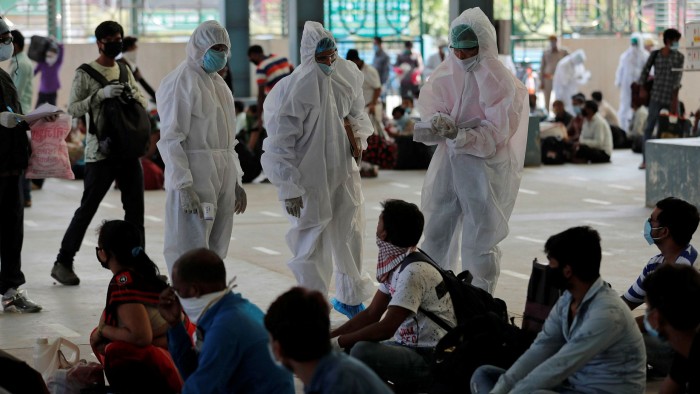
Roula Khalaf, Editor of the FT, selects her favourite stories in this weekly newsletter.
Welcome to FT Health, a monthly guide to the big issues at the intersection of global health and finance. Technology and investment are changing the face of healthcare while coronavirus is testing the world’s health systems like never before. This newsletter delivers news, interviews, data and the best health journalism from across the web. Send us feedback via health@ft.com.
FT subscribers can sign up here for the email version here and non- subscribers here.
Coronavirus may be a great leveller but it is certainly no equaliser. While anyone, rich or poor alike, is at risk of infection, it seems clear that the most disadvantaged are suffering disproportionately. In the industrialised world, that applies particularly to ethnic minorities and those on the margins of society, highlighting Prof Michael Marmot’s warnings of inequalities in health.
Such divisions are particularly sharp in lower-income countries, where governments face even more forbidding trade-offs. Authorities have imposed lockdowns that are proving difficult to implement in densely crowded settlements, where informal sector workers live close to the breadline. These economies are more vulnerable to the global depression than elsewhere; and their budgets less able to provide support.
At the same time, they are juggling the dangers of backsliding in the battle against other diseases such as malaria compared to what remains — in Africa at least — a so far modest health impact of Covid-19 itself. As the Centre for Global Development, a think-tank, argues, there needs to be a greater focus on the cost effectiveness of different medical interventions and ways to ensure products are fairly allocated around the world.
But the greatest risk at a time of growing vaccine nationalism, as in politics more broadly, is that the spirit of solidarity is lost.
This week’s EU-led international pledging meeting for coronavirus got off to a good start, raising $8bn. Yet a number of countries — starting with the US — have spurned such initiatives, with a focus on helping their own citizens or seeking bilateral partnerships with selected governments and organisations elsewhere. Without greater cross-border co-operation, every nation will be worse off.
Recommended links
WHO coronavirus resources
FT maps and data
FT report: Combating coronavirus
Three questions
Seth Berkley, head of Gavi, the global vaccine alliance, speaking just after World Immunisation Week and in the build up to fundraising at the Global Vaccine Summit in London next month.
What impact is coronavirus having on existing immunisation programmes?
There is already a slowdown. We recently estimated 13.5m people were missing out on vaccines in 14 countries. That’s an underestimate and it will be larger. We’re worried, particularly as this may go on for quite a long period. What we’re going to have to do is be prepared, like after Ebola in Africa, to go back and rapidly do catch-up campaigns to try to return population immunity.
How should the world support Covid-19 vaccine research?
We have to think about this as a global problem. There is an unprecedented rollout that will probably peak at 200 or more vaccines in development. We need to prioritise a smaller number because we can’t do advanced trials in so many. We don’t know yet which ones will work best. There is going to be the promotion of many different vaccines. The critical issue is to get the best ones.
How will poorer countries access a vaccine?
In developing countries, we need some type of global access agreement, which will be tough in this political environment. Plus we need to be prepared to manufacture “at risk”. If we can get a prioritised list of approaches, we can begin to ensure adequate production. Gavi already provides vaccines to 73 countries representing 50 per cent of the world’s population. If we’re asked, we might also be able to do procurement for non-Gavi middle income countries.
News round-up
Trumping the WHO There was a robust international response to US President Donald Trump’s decision to stop funding the World Health Organization. Countries such as Venezuela will be particularly badly hit. Some critics argue that — unlike during the global financial crisis — there is no leader or global plan to fight the coronavirus pandemic effectively.
Here’s a good backgrounder on US relations with the WHO. The US provided $893m of the WHO's $5.62bn budget for 2018-19 — nearly one in every six dollars. (Guardian, AP, Kaiser, FT graphic)
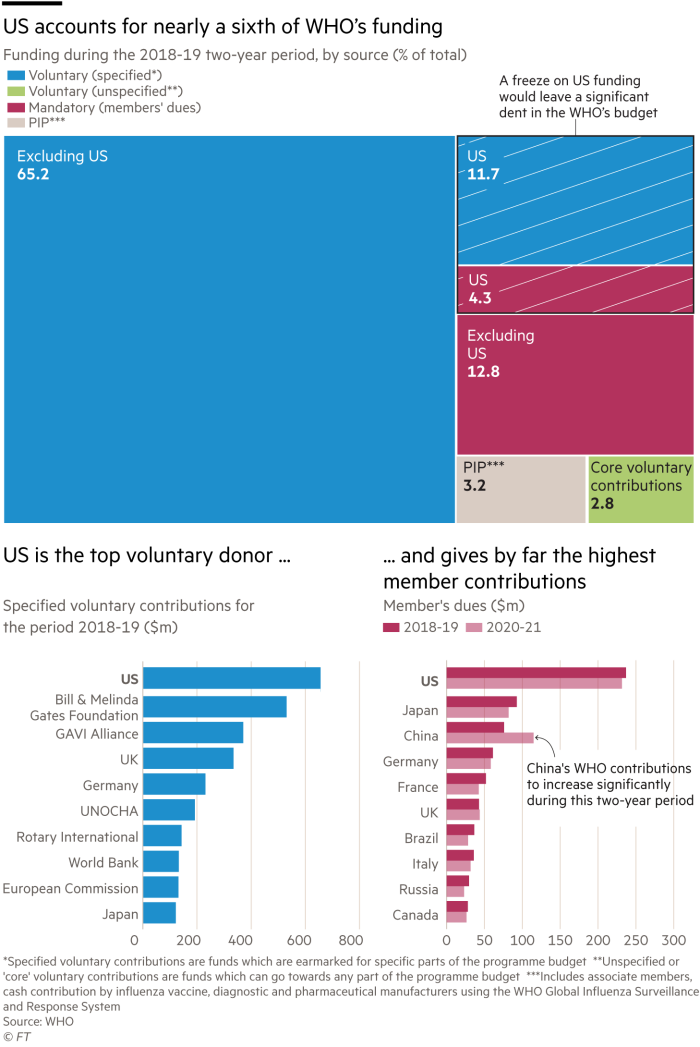
Hunt for Covid-19 drugs Drugmakers have scaled up vaccine efforts and are testing many existing drugs for suitability as treatments. Remdesivir, an antiviral from Gilead, has become a bellwether for investor sentiment despite its unproven ability to treat coronavirus. Companies and governments are struggling to navigate intellectual property law as they search for therapies. The WHO is co-ordinating a global “accelerator” to speed development and production. (FT, Observer, WEF)
Focus on . . . charting the pandemic The FT has expanded its range of free-to-read charts documenting the spread of Covid-19, excess mortality and other indicators such as the business and environmental impacts of lockdowns. The Lancet has a real-time dashboard of global data from clinical trials.
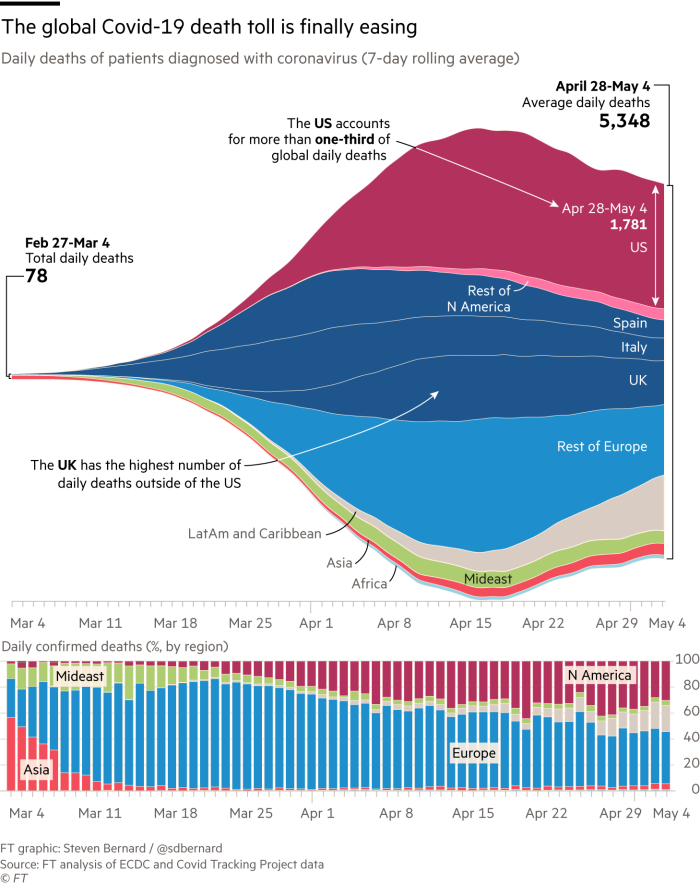
Impact on US Many hospitals in the US — the country with the most Covid-19 deaths — are facing cash shortages because they have had to cancel the elective procedures that they rely on to make money. Despite the march of the disease across the country, the White House had considered winding down its task force by the end of the month. The pandemic is also destroying the business model of nursing homes. The US spends more on healthcare than any other nation but will the pandemic reduce or accelerate that spending? (FT, NYT, Jama podcast)
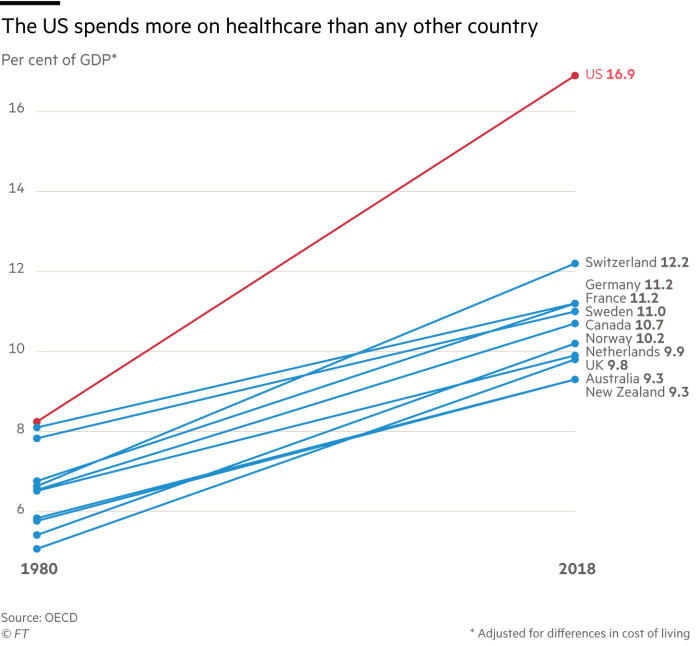
Mobilising tech Contact tracing is an essential part of a government’s armoury for reopening shuttered economies. Apple and Google have put rivalry aside to develop “track-and-trace tools” for government use, but critics have voiced fears about some apps enabling a “surveillance state”. Here’s how the UK version works. A mobile symptom tracker could help predict outbreak hotspots. (FT, Science)
Funding the fight The Gates Foundation said it would turn all its firepower on to Covid-19, even though this would disrupt its work in other areas. Watch our interview with Bill Gates about how countries need to tackle the virus and how to prevent the world from being caught off guard by another pandemic. This forms part of our series of video interviews with leading global figures including David Miliband of the International Rescue Committee and Phumzile Mlambo-Ngcuka of UN Women.
Dangers of distraction Other deadly diseases that are receiving less attention as the world focuses on coronavirus include HIV, especially in countries like Zimbabwe. Tuberculosis is another: new modelling suggests there could be an additional 6.3m cases of TB and an extra 1.4m deaths between 2020 and 2025. (FT, The Lancet, Global Press Journal, Devex, Stop TB Partnership)
Focus on . . . malaria One unhelpful distraction was a run on a malaria drug touted by President Trump as a possible Covid-19 treatment. Progress against malaria has been stalling in recent years but new WHO projections show the current crisis could set it back by 20 years, with Africa badly hit. Read the FT report: Combating malaria.
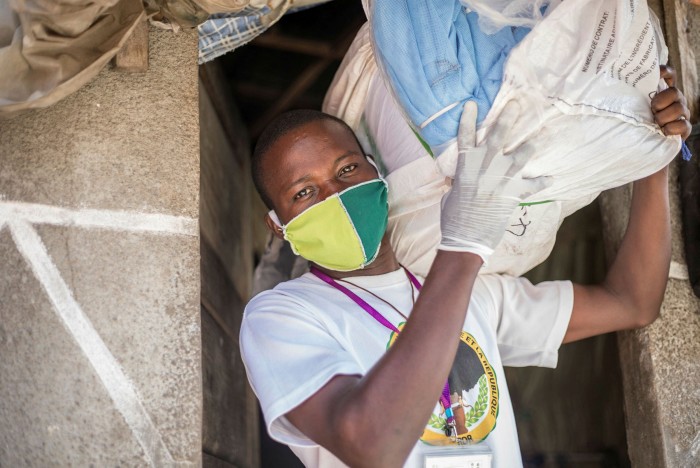
Cancer warning Cancer treatment could also fall victim to the pandemic. New modelling suggests a fifth more UK deaths over the next 12 months than would have been expected. Screening can identify many types of cancer at early stages but during the crisis, much of this has been suspended. The pandemic has also halted many clinical trials. Cancer Research, the leading UK charity, has cut funding for research in response to huge fundraising shortfalls caused by the current crisis. It’s not just cancer: many other UK clinical trials have been halted. (FT, BMJ)
Fighting fake news The pandemic has once again brought anti-vaxxers to the fore, some of whom are mobilising even before one is found for coronavirus. Belated but welcome responses from social media platforms — the main propagators of misinformation — include Facebook users receiving pop-up alerts directing them to WHO information and WhatsApp limiting the mass forwarding of messages. There are myth-busting lessons to be learned from the fight against HIV. (FT, NYT, BBC, The Conversation)
Maternal and child health The UN said the coronavirus pandemic would have a “catastrophic” effect on women’s health. If the average lockdown continues for six months, some 47m women in low- and middle-income countries would be unable to use contraception, creating an additional 7m unintended pregnancies. The knock-on result for primary health has serious implications for child mortality. (UNFPA, Global Financing Facility)
Smoke signals Anti-tobacco campaigners were dismayed by the reporting of nicotine as a protection from Covid-19 but buoyed by data showing many people quitting for the opposite reason. Public Health England is among organisations warning of the dangers of smoking. From next June, US smokers will see graphic images of lesser known smoking risks such as stunted foetal growth on their cigarette packs. (Expose Tobacco, Guardian, Gov. UK, Jama)
Nurses needed The world is short of six million nurses, according to the first State of the World’s Nursing report by WHO and partners. Some 90% of the shortage is in Africa, south-east Asia, and the eastern Mediterranean. Filling the gap requires a “recalibration of education, workforce planning, and investment levels” and an end to the “raiding” of developing world nurses by rich countries. (WHO, Lancet, SciDevNet)
Best from the journals
Covid-19 and mental health Mental health science research must be central to the international response and healthcare providers should integrate psychosocial support into their approach. Mental health problems are also spreading among health workers. Three new books highlight therapeutical benefits of nature in lockdown. (The Lancet Psychiatry, NEJM, Science, New Statesman)
Migrant health The pandemic has highlighted the multiple threats to migrants and refugees who live in places where physical distancing is impossible and sanitation very poor. (The Lancet)
Obesity risks Several studies have highlighted the high risk of coronavirus infection for people with obesity. An adviser to the UK government wrote for the FT on how chronic diseases are driven by deficient housing, pollution and insecure work as well as bad diets. “We have loaded the dice against the poor and this is being cruelly exposed by the pandemic.” (Obesity, FT)
Superbug struggle Childhood vaccination may be a powerful tool against antimicrobial resistance in low- and middle-income countries. A new study found that two common vaccines significantly reduced the rates of acute respiratory infections and diarrhoea among small children, leading to less resort to antibiotic treatment. There are many parallels between AMR and the coronavirus pandemic. (Nature, FT)
Taxing for health All countries — but especially low- and middle-income ones where non-communicable diseases like diabetes are on the rise — can benefit from tax increases on tobacco, alcohol and sugary drinks. Improvements to health can be substantial while also raising government revenues, which can in turn increase public health funding. Another study shows the potential of health warning labels on alcohol and food. (BMJ, BMC Public Health)
Pick of the pods
Public health vs the economy The debate over how to reopen an economy safely has mutated into a culture war, especially in the US. (BMJ Talk Medicine, 49m)
Mental health Interview with Carmine Pariante of King’s College London, on the effects of social isolation. (Guardian, Science Weekly, 14m)
Heath tech Major tech changes during the coronavirus pandemic such as the boom in telemedicine, regulatory shifts in billing, and the use of location data to track disease could all become permanent. (Geekwire, 35m)
Immunisation How does immunisation fit within the debate around universal health coverage? (CSIS Take as Directed, 22 mins)
Conspiracy theories A six-part podcast series on the history of conspiracy theories and how and why they spread. (The Conversation)
The month ahead
May 8 World Red Cross and Red Crescent Day
May 12 Global Nutrition Report
May 12-14 FT Global Boardroom, a free online event on the impact of the coronavirus pandemic. Speakers include Tony Blair, former UK prime minister; Haruhiko Kuroda, governor of the Bank of Japan; and Al Gore, former US vice-president and chairman of The Climate Reality Project. The event is free to join. Browse the agenda and register here.
May 15 FT magazine: The Future of AI and Digital Healthcare
May 17-21 World Health Assembly, the WHO decision-making body
May 18 Annual meeting of world health ministers
May 18-24 UK Mental Health Awareness Week
May 31 World No Tobacco Day
June 3 Next edition of FT Health
June 3-4 Global Vaccine Summit
End notes
Contact Email us via health@ft.com, like us on Facebook and follow us on Twitter @fthealth and LinkedIn.
FT Health by email Register here to get FT Health in your inbox on the first Wednesday of each month.
More FT resources You can find all FT in-depth health reports at FT Health Centre.
Coronavirus Business Update Sign up here for our newsletter chronicling the epidemic’s impact on markets, global business, workplaces and our daily lives. The FT is offering a free 30-day trial to this email, which includes access to FT.com.
Final thought
For millennia, epidemics have tested friendships, faith and society. But, amid the horror there is hope, writes historian Simon Schama.
Comments